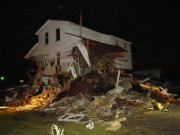Greece (MNN) — A fresh wave of anti-austerity strikes hit Greece Wednesday. The Troika's visit was due. Paul Jenks with AMG International explains, "They come each quarter to investigate the progress that the Greek government has made, and unfortunately this time they discovered the proposal that was made was lacking."
Leaders of the struggling governing coalition were told to cut deeper, or risk losing vital rescue loans. Jenks says, "There is concern that there will have to be layoffs and things in the government, which is a considerable problem for the unions and for the politicians there."
The proposal laid on the table before Greece: over the next two years, employers were to increase staff working hours up to 78 hours a week, a reduction in redundancy notice periods from the current 4-6 months, and an increase in retirement age to 67 from 65.
The creditors are demanding additional cuts of nearly 12 billion Euro, and the cycle continues. "They're deeply in debt and trying to borrow more money or extend the terms of the loan that they already have, and the rest of Europe is running out of patience." The government faces a potential collapse even as there are more questions about whether or not a withdrawal from the Eurozone equals default or not.
Unemployment has reached 23%, with youth unemployment approaching 50%. About 500 people are losing their jobs everyday, so more than 14,000 new unemployed people entering this dreadful stage of life every month stay practically helpless and hopeless. Jenks says, "In the age group 18-25, more than half of the young adults are out of work. As it stretches out for a longer and longer period of time, the young people–the ones most likely to take to the streets and to be active in protests–are just very, very unhappy."
It seems like round after round of cuts have come until there's nothing left to cut. Many families have seen both parents lose their jobs, and suffering is widespread. Even those who still have jobs have seen their salaries decrease dramatically. Homelessness is rampant.
Jenks says they're hit on two fronts. First, "There are many refugees in the country, illegally, who are being supported by the government, but also by the churches, by Christians there; and the need is growing all the time." Second, they run a large hospital in Thessaloniki. State-run hospitals are running on fumes, if they're running at all. Although the situation is better at the privately-run St. Luke's, Jenks says, "The concern is [regarding] the claims that are submitted to the insurance companies: the money comes from these loans that are coming from the European Union, so we watch this news very closely."
Staffed with 450, the hospital helps 2,200 people every month. They don't turn people away because there aren't alternatives. However, the government hasn't paid St. Luke's for services rendered for nearly a year, which means hospital vendors aren't getting paid on time, either. The snowball effect has been troubling for the hospital, although a credit line and donations eased the crunch a bit. Will the doors stay open? "It just is a month-by-month issue of how much comes in from the government. Many times, those claims that we've made are way past 'normal' time frames."
Pray. Ministry leaders are stressed all the time. There is no immediate relief from the grinding poverty and the weight of the uncertainties and anger. However, because this is true, "People continue to turn an open ear to things that are spiritual. It seems that as people are faced with these financial crises, they're more willing to turn away from some of their more secular, humanistic tendencies and listen to things that are more spiritual. They're certainly willing to have people pray with them."
It's an incredibly difficult time for Greece, and the AMG team is often overwhelmed by the need, yet they do their best to share God's love. Please pray for strength and wisdom for them, as well as for the resources to provide help to those who truly need it.

